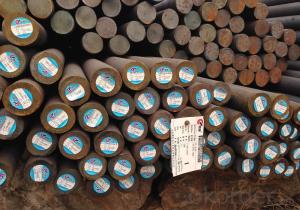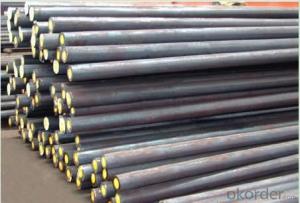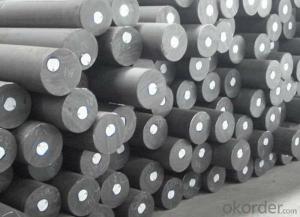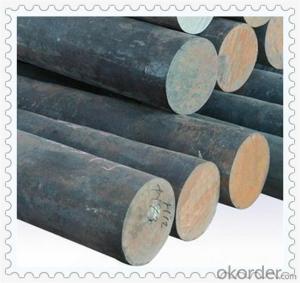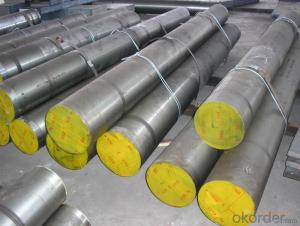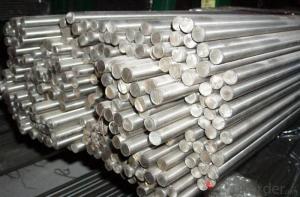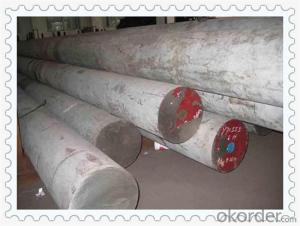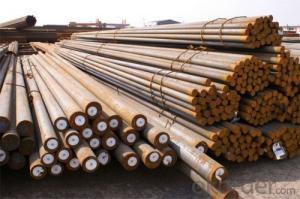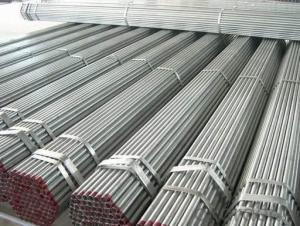Aisi 4140 Alloy steel Mould Steel Round Bar
- Loading Port:
- China main port
- Payment Terms:
- TT or LC
- Min Order Qty:
- 25 m.t.
- Supply Capability:
- 10000 m.t./month
OKorder Service Pledge
OKorder Financial Service
You Might Also Like
Specification
The details of our Steel
1. Produce Standard: as the GB, AISI, ASTM, SAE, EN, BS, DIN, JIS Industry Standard
2. Produce processes: Smelt Iron -EAF smelt Billet - ESR smelt Billet -Hot rolled or forged get the steel round bar and plate
3. Heat treatment:
Normalized / Annealed / Quenched+Tempered
4. Quality assurance:
All order we can received Third party inspection, You can let SGS, BV,.. and others test company test and inspect our products before Goods shipping.
Product information
1.Chemical Composition(%)
C Si Mn P S Cr Ni Mo |
0.42 0.30 0.60 ≤0.025 ≤0.025 1.00 ≤ 0.25 0.20 |
2.Equivalent Grades
Alloy Steel 4140\ DIN 42CrMo4\1.7225\SCM440
3.Heat treatment
Normalized / Annealed / Quenched / tempered
4.Delivery condition
Hot forged, black sur face or Turned (optional) , rough machined(optional)
5.Certification
ISO9001:2008;SGS Test;Mill Certificate Test
6.Tempering
Heating to 550 - 650 ° C and maintenance regime, again depending on the mechanical
Product show

Workshop show

- Q: How does special steel perform in high-temperature mechanical applications?
- Special steel is specifically engineered to excel in mechanical applications that involve high temperatures. Unlike regular steel, it contains alloying elements like chromium, nickel, and molybdenum, which augment its heat resistance and mechanical properties. When exposed to high temperatures, special steel showcases remarkable strength and toughness, enabling it to endure the demanding conditions found in such environments. It maintains its structural integrity even when subjected to extreme heat, rendering it suitable for applications such as furnaces, boilers, and gas turbines. Moreover, special steel retains its dimensional stability at elevated temperatures, meaning it does not easily deform or warp. This characteristic is crucial in high-temperature mechanical applications that demand precise dimensions and tight tolerances for optimal performance. Furthermore, special steel exhibits exceptional resistance to corrosion, even at high temperatures. This resistance is critical in preventing the formation of oxide scales and minimizing the risk of premature failure caused by corrosion. In conclusion, the enhanced heat resistance, strength, toughness, dimensional stability, and corrosion resistance of special steel make it highly adept in high-temperature mechanical applications. It delivers reliability and durability in extreme heat conditions, establishing it as the preferred choice for various industries encountering high-temperature environments.
- Q: How is special steel tested for quality?
- Special steel is tested for quality through a series of rigorous examinations and tests. These include visual inspections, chemical composition analysis, mechanical property testing, and non-destructive testing methods such as ultrasonic testing and magnetic particle testing. These tests ensure that the special steel meets the necessary standards and specifications for its intended use, guaranteeing its quality and performance.
- Q: How is stainless tool steel used in the manufacturing of surgical instruments?
- Stainless tool steel is commonly used in the manufacturing of surgical instruments due to its exceptional properties such as corrosion resistance, high strength, and durability. This type of steel ensures that surgical instruments can withstand frequent sterilization processes without corroding or deteriorating. Additionally, stainless tool steel allows for precise shaping and sharpening of surgical instruments, ensuring their effectiveness and longevity in medical procedures.
- Q: How does special steel contribute to the power generation aftermarket industry?
- The power generation aftermarket industry relies heavily on special steel, which is essential for constructing and maintaining power generation equipment. Special steels, such as stainless steel and alloy steel, possess unique characteristics that make them perfectly suited for the demanding conditions of the power generation sector. One of the key advantages of special steel in the power generation aftermarket industry is its exceptional resistance to corrosion and oxidation. Power generation equipment, such as gas turbines and steam generators, operate in harsh environments with extreme temperatures, pressure, and exposure to various chemical elements. Special steel's corrosion resistance ensures that the equipment can withstand these challenging conditions, minimizing the risk of failure and extending the lifespan of the equipment. Furthermore, special steel provides excellent strength and toughness, enabling power generation equipment to withstand high mechanical stress and fatigue. Turbines, boilers, and other heavy machinery in the power generation industry undergo continuous operation and significant loads. Special steel's high strength and durability allow these components to endure these demanding conditions, ensuring safe and reliable operation. Special steel also maintains dimensional stability under extreme temperatures, which is crucial for power generation equipment. As power generation equipment often operates at high temperatures, special steel's thermal stability prevents distortion and deformation, ensuring that the equipment retains its shape and functionality over time. Additionally, special steel's versatility enables the production of customized components and parts that meet the specific requirements of power generation equipment. Whether it is turbine blades, boiler tubes, or heat exchangers, special steel can be tailored to provide the desired mechanical properties, corrosion resistance, and thermal stability required for each application. Overall, special steel is an indispensable material in the power generation aftermarket industry. Its corrosion resistance, strength, toughness, thermal stability, and versatility make it an ideal choice for constructing and maintaining power generation equipment. By providing reliable and durable materials, special steel contributes to the efficiency, safety, and longevity of power generation systems, ensuring the continuous supply of electricity to meet the growing demands of our modern world.
- Q: What are the different high-temperature grades of special steel?
- There exists a variety of special steel grades that can withstand extreme heat and provide enhanced mechanical properties. Some of the frequently utilized high-temperature grades are as follows: 1. Stainless steel 310: Renowned for its exceptional resistance to oxidation at high temperatures, this grade boasts a high chromium and nickel content, resulting in excellent corrosion resistance and elevated temperature strength. 2. Inconel 625: Inconel alloys, which are nickel-based superalloys, exhibit remarkable resistance to oxidation and corrosion. In particular, Inconel 625 offers outstanding strength and toughness at high temperatures, rendering it suitable for applications in aerospace and chemical processing industries. 3. Hastelloy X: A notable example is Hastelloy X, a nickel-chromium-iron-molybdenum alloy that showcases extraordinary strength and oxidation resistance at elevated temperatures. It finds widespread use in gas turbine engines, industrial furnace components, and other high-temperature applications. 4. Alloy 800H: This specific grade of special steel is an austenitic alloy that possesses high resistance to oxidation, carburization, and nitridation. It frequently finds application in heat exchangers, furnace components, and petrochemical industries. 5. Titanium Grade 5: While technically not steel, titanium grade 5 is a high-temperature alloy that delivers exceptional strength and corrosion resistance at elevated temperatures. It is commonly employed in aircraft engine components, chemical processing equipment, and marine applications. These examples merely represent a fraction of the high-temperature grades of special steel available in the market. Each grade serves a specific purpose, excelling in various applications that demand extreme heat resistance and specific mechanical properties.
- Q: What are the properties of martensitic steel?
- Martensitic steel is characterized by its high strength, hardness, and wear resistance. It possesses a unique microstructure consisting of a body-centered tetragonal crystal lattice, resulting in its distinctive properties. Martensitic steel can be hardened through quenching and tempering processes, allowing it to maintain its strength even at elevated temperatures. Additionally, it exhibits good corrosion resistance and is commonly used in applications that require high toughness and durability, such as in cutting tools, surgical instruments, and automotive components.
- Q: Can special steel be used in electrical applications?
- Yes, special steel can be used in electrical applications. Special steel, such as electrical steel or transformer steel, is specifically designed to have low electrical resistance and high magnetic permeability, making it ideal for use in electrical equipment like transformers, motors, and generators.
- Q: What are the main industries that use special steel?
- The main industries that use special steel include automotive, aerospace, construction, energy, machinery, and tool manufacturing.
- Q: What are the different annealing techniques used for special steel?
- Some of the different annealing techniques used for special steel include full annealing, process annealing, spheroidizing annealing, and stress relieving annealing. Full annealing involves heating the steel to a temperature above its critical point and then slowly cooling it to room temperature. Process annealing is used to improve the machinability of the steel by heating it to a lower temperature and then cooling it in a controlled manner. Spheroidizing annealing is used to soften the steel and improve its ductility by heating it to a temperature just below its critical point and then cooling it slowly. Stress relieving annealing is used to reduce internal stress in the steel by heating it to a temperature below its critical point and then cooling it slowly.
- Q: What are the main challenges in welding special steel?
- The main challenges in welding special steel include its high carbon content, which can lead to cracking and distortion during the welding process. Additionally, special steels often have higher alloy content, making them prone to heat-affected zone (HAZ) issues such as reduced strength and corrosion resistance. Controlling the heat input and using suitable welding techniques and filler materials are crucial for successfully welding special steel.
Send your message to us
Aisi 4140 Alloy steel Mould Steel Round Bar
- Loading Port:
- China main port
- Payment Terms:
- TT or LC
- Min Order Qty:
- 25 m.t.
- Supply Capability:
- 10000 m.t./month
OKorder Service Pledge
OKorder Financial Service
Similar products
Hot products
Hot Searches
Related keywords
